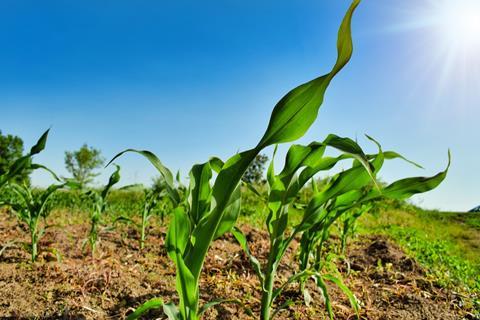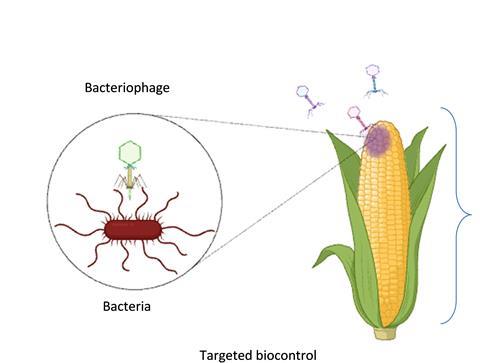Use of phage therapy in farming could be valuable in replacing chemical pesticides with a safer and greener alternative, helping to address climate change, according to a new review.

The review explores the potential of bacteriophages as innovative biocontrol agents in agriculture, focusing on addressing the growing challenges of climate change, food security, and agricultural sustainability.
READ MORE: Plant bacteria deploy phage elements to wipe out the competition
READ MORE: Attenuated viruses could be used to enhance crop performance
‘Bacteriophages: Sustainable and effective solution for climate-resilient agriculture’ is published in Sustainable Microbiology, an Applied Microbiology International publication.
Climate resilience
“Climate change has been a great threat to food security and the sustainability of agriculture around the world - therefore there is a need to develop new strategies which would increase the climate resilience of agriculture,” says corresponding author Dr Helen Onyeaka from the University of Birmingham.
“We sought to examine the use of bacteriophage therapy as an alternative to antibiotics in agricultural settings, considering their potential impact on crop system adaptability, soil health, food security, and water management in the face of challenges like rising incidences of pests and diseases.”

The authors undertook a comprehensive review of all previous studies on applying bacteriophages in the agricultural sector, particularly their relevance to combating the adverse effects of climate change.
“Attributed to their natural tendency to especially and replicate within bacterial pathogens, as well as their ability to adapt to diverse environmental conditions, we found that phages are a less harmful substitute for chemical pesticides,” Dr Onyeaka said.
Phage-mediated biocontrol
“Phage-mediated biocontrol not only appears effective against pathogenic bacteria but also contributes to active plant development, improvement of soil parameters, the health of pollinators as well as enhancing overall crop productivity.
“Apart from these, we also examined the application of phages in food storage and water management. However, while these results are encouraging, we also report that their application is limited by constraints such as narrow host range, environmental limitations and governmental restrictions.”
Use of bacteriophages to target bacterial pathogens is common knowledge, but the authors were surprised as to how exactly they could do that without affecting other organisms or the environment.
Self-replicating
“The bacteriophages displayed such selectivity that it implies their potential to be a greener replacement for chemical pesticides from the market. The other unique finding is that it was discovered that these phages can replicate themselves thus making them sustainable in agriculture. With an inability to treat a wide range of bacteria, however, their implementation is challenging on a more widespread basis,” Dr Onyeaka said.
“The findings underscore the potential role of phage application in modern agricultural practices due to adverse climatic changes. Indeed, the practices of phage use are safer and environmentally friendly in replacing the use of chemical pesticides that carry with them adverse damaging effects on the ecosystem thus promoting a healthier environment.
“Thus, the inclusion of phage therapy into the farming systems would mean that such a form of agriculture is capable of addressing climate change in food production and security as well as economic growth at large.”
Host trange
Additional research is warranted to broaden the host range of the phages, improve their resistance to environmental conditions and overcome regulatory hurdles to speed up their use in practice, she added.
“Education and outreach are also essential to boost farmers’ understanding of how and why phage-based alternatives would work and therefore facilitate their adoption into environmentally friendly farming systems.”
The review conducted was not supported by any funding and was borne out of mutual interest in exploring the potential of phages in agriculture. It was conducted based on collaborative discussions among experts, phage technology, and innovations such as Helen Onyeaka, Carrie Furr from Bacteriophage & Drug Development Consultants, Francesca E. Hodges and Pedro Carvalho from Innovate UK Business Connect, and Kehinde Favour Siyanbola.
‘Bacteriophages: Sustainable and effective solution for climate-resilient agriculture’ appeared in Sustainable Microbiology.
Topics
- Agriculture
- Applied Microbiology International
- Bacteriophage & Drug Development Consultants
- biocontrol agents
- Carrie Furr
- Climate Action
- Community
- Food Security
- Francesca E. Hodges
- Healthy Land
- Helen Onyeaka
- Innovate UK Business Connect
- Kehinde Favour Siyanbola
- Pedro Carvalho
- Phage Therapy
- Research News
- Soil & Plant Science
- UK & Rest of Europe
- University of Birmingham
- Viruses







No comments yet